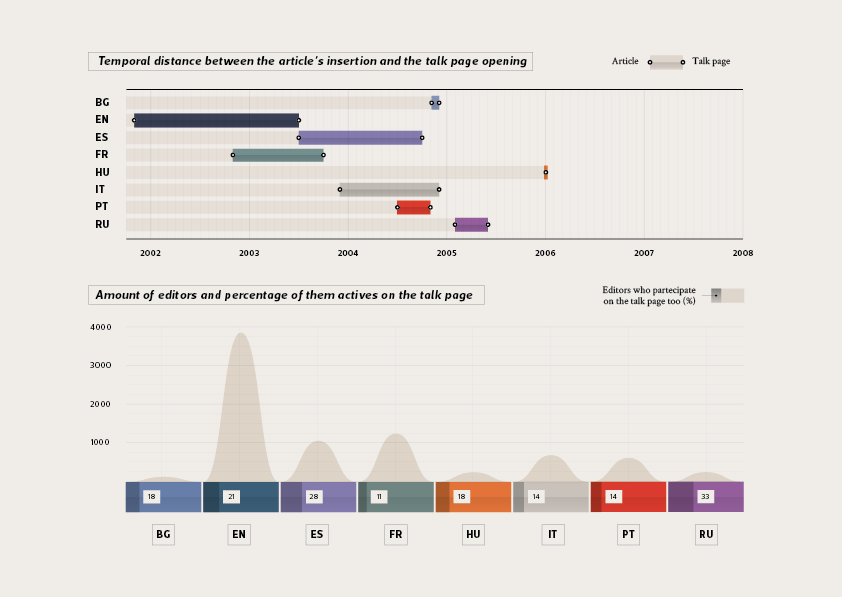Abstract
Wikipedia is one of the main sources of information to which people access when they need a fast information (alexa.com). The encyclopedia is now available in 288 linguistic editions (May 2015), written and maintained by more than thirty-nine million registered users worldwide.
The collaborative creation of Wikipedia’s contents not only guarantees a large coverage of topics but also facilitates a quick update of the entries, according to their current state of development. But, at the same time, the different training of users who edits and the delicacy of some topics might make the creation process more difficult. To overcome the problem, the Wikipedia communities drew up a series of guidelines, including the invite to maintaining a neutral point of view (NPOV). Users are therefore required to produce articles that “represent quite proportionally and, as far as possible, without bias, all significant positions views collected from reliable sources”.
But what happens when a topic takes on a different meaning depending on the cultural background? Culture is a factor that strongly affects the construction of knowledge and plays an important role in critical issues profiling. The same neutrality is culturally subjective and can not be reduced to an universal definition: cultural differences influences the structure of articles, the contents contained in it and produces a uneven distribution of changes activity between the page’s sections, dictated by the interests of the community. The goal of the project is to verify how much of the cultural perception of a controversial issue can emerge using a semi-automated analysis to examine more language versions of the same article. The final output of the survey is a panoramic view of ideologies, priorities and behaviours own of different editions users which emerges in their linguistic definition of a particular social controversy.

Research question
Which aspects of a controversy is a semi-automated analysis able to return? Is it possible to depict the different cultural points of view on a controversial topic analysing Wikipedia? Can the results be used to improve awareness on the existing differences among cultural approaches on the controversy?
These are the principal questions that I’ve put as starting point of my research project and to whom I hope to be able to provide an answer to with the publication of obtained results.
Method
CHOICE OF A CONTROVERSIAL TOPIC – As first step, I chose a subject characterized by different connotations according to specific cultural backgrounds of communities:homosexuality seems to be a critical theme for many culture and each nation has an own level of tolerance of it. The meeting between a separate management of the phenomenon and the self- maintenance and conduction of Wikipedia’s editions is a favourable occasion to observe not the emergence of different points of views but the simultaneous existence of several neutral definition of homosexuality.
RELEVANCE CHECK – The second step is an examination of the effective consideration of the theme verifying how many editions have a dedicated article about that and subsequently the selection of eight European communities which have a different statement versus homosexuality: (reports of Ilga-Europe association on human rights situation of LGBTI people in Europe).
DATA COLLECTION – The correspondent pages in each linguistic edition are been investigated reporting data from various features not directly connected with content. The data collected with quantitative, semantic and qualitative analyses has permitted to make a cross-cultural comparison on several aspects of debate (as user, edits and macro-areas of discussion) and returned some information about communities approach to homosexual phenomenon. The comparison is structured in five point of interest: development of discussion in time, behaviour and characteristic of user, elements of discussion, cultural interest on topic, self or global focus.

Results
The thesis project determines how much a semi-automatic analysis can be effective to discover a possible connection between the various cultural approaches behind a dispute and its translation on Wikipedia. The platform is a functional and effective research context for this kind of research thanks to its division into language editions and for the structuring data that collects and provides for each page. The agnostic collection of information to compare and the condition of linguistic leveling recreated with the visualizations allow to provide an overview of the disputes on topic without prejudices and easily accessible by users without specific linguistic skills. The role of the designer is so indisputably necessary in order to permit a simultaneous cross-linguistic comparison of topics controversy from a set of complex data. The visualizations stand out the differences of communities' approaches through a structured and accessible explication of several complementary aspects that together defines the controversy. From the investigation emerges a management of information about homosexuality linguistically dictated, not equivalent between editions, and a clear lack of homogeneity in users’ activity on the pages. Being a cross-linguistic analysis isn’t correct to say that the languages profiles obtained coincide with the positions of eight specific cultures. However, in some cases, the analysis revealed a clear connection between communities’ behaviors and cultural bias, especially for languages which are proper of just one country. A focus of activity on some specific aspects indicates an affinity of interests and a supposed cultural proximity of who writes the contents.













